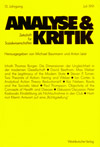ohne Titel

1999 (21) Issue 2
Table of Contents
Title: Gerechtigkeit
Author: Anthony de Jasay
Page: 143-170
Abstract: The concept of justice informs our sense of justice, rather than being formed by it. The concept escapes circularity, resting as it does on foundations that are independent of notions of justice. Those foundations can be found in constituent principles such as responsibility, presumption, and convention. Two realms of justice have to be separated: the realm of 'suum cuique' and of 'to each, according to... '. Contemporary theories of justice, however, tend to maximize their scope by obliterating 'suum cuique'. But the importance of the realm of 'suum cuique, anchors in fundaments of logic and epistemology which allow justice but little leeway.
Title: Verteilungsgerechtigkeit ohne Verteilungsgleichheit
Author: Thomas Schramme
Page: 171-191
Abstract: Alternative approaches in the discussion of distributive justice differ in their answers to the question 'equality of what'? In this essay I intend to ask instead 'why equality'? The article rejects several arguments in favour of distributive equality, mainly on the grounds that they confuse two different kinds of justice, namely 'formal' justice (equal respect) and distributive justice. The ideal of distributive equality is based on comparisons but equal respect does not necessarily involve relational considerations. Subsequently I will consider equality of opportunity which appears on first sight to be the most promising account. However, I will point out that this approach is not convincing as an attempt to give everyone the chance to live a good life. Finally I will submit that only a theory of absolute needs is adequate.
Title: Die 'sozialdemokratische' und die 'liberale' Variante der neoaristotelischen Sozialphilosophie
Author: Frank Dietrich
Page: 192-212
Abstract: This article examines the neoaristotelian theories of Martha Nussbaum and Douglas Rasmussen/Douglas Den Uyl. Both sides give a similar account of good human living, which emphasizes the significance of individual autonomy. But they disagree sharply on the political institutions necessary to promote human flourishing; Nussbaum formulates a 'social democratic, position; Rasmussen/Den Uyl hold a 'liberal' standpoint. The article explores both lines of reasoning. It is shown that neither Nussbaum nor Rasmussen/Den Uyl present conclusive arguments for their political position.
Title: Autonomie, Charakter und praktische Vernunft: Überlegungen am Beispiel des Utilitarismus
Author: R. Jay Wallace
Page: 213-230
Abstract: This paper explores the question whether utilitarianism is compatible with the autonomy of the moral agent. The paper begins by considering Bernard Williams' famous complaint that utilitarianism cannot do justice to the personal projects and commitments constitutive of character. Recent work (by Peter Railton among others) has established that a utilitarian agent need not be free of such personal projects and commitments, and could even affirm them morally at the level of second-order reflection. But a different and more subtle problem confronts this approach: the use of utilitarian principles to justify the cultivation of personal projects and attachments undermines the autonomy to support this objection, according to which autonomy is a matter of acting in a way one can reflectively endorse.
Title: John Searle's Social Ontology. Comment to John R. Searle "Social Ontology and the Philosophy of Society" (ANALYSE & KRITIK 20, 143-158)
Author: Eerik Lagerspetz
Page: 231-236
Abstract: The theory presented in John Searle's "The Construction of Social Reality" has a lot in common with the conventionalist view of institutions. Conventionalism, however, can explain how there can be institutional facts without pre-existing rules, and why people comply with institutional rules.
Title: Collective Intentionality, Self-referentiality, and False Beliefs: Some Issues Concerning Institutional Facts. Comment to John R. Searle "Social Ontology and the Philosophy of Society" (ANALYSE & KRITIK 20, 143-158)
Author: Bruno S. Celano
Page: 237-250
Abstract: J. R. Searle's general theory of social and institutional reality, as deployed in some of his recent work (The Construction of Social Reality 1995; Social Ontology and the Philosophy of Society 1998), raises many deep and interesting problems. Four issues are taken up here: (1) Searle's claim to the effect that collective intentionality is a primitive, irreducible form of intentionality; (2) his account of one of the most puzzling features of institutional concepts, their having a self-referential component; (3) the question as to the point, or points, of having institutions; (4) Searle's claim to the effect that false beliefs on the part of the members of the relevant community are compatible with the existence of related institutional facts. It is argued that, under all four respects, Searle's theory proves to be hardly satisfactory.
Title: On Some Difficulties Concerning John Searle's Notion of an 'Institutional Fact'. Comment to John R. Searle "Social Ontology and the Philosophy of Society" (ANALYSE & KRITIK 20, 143-158)
Author: Carsten Heidemann
Page: 251-264
Abstract: John Searle's conception of institutional facts figures centrally in his latest works. It is defective for several reasons: (1) Searle's argument for philosophical realism is inconsistent. (2) Searle's conceptions of consciousness and collective intentionality are problematic. (3) The notion of normativity is indispensable in Searle's system, but cannot be accounted for and makes wide parts of his theory superfluous. (4) It is not clear what entities might be regarded as institutional facts. These problems have a common source: The philosophical basis of Searle's theory, his combination of realism and physicalist monism, clashes with his thesis that both the 'first-person-ontology' and normativity are irreducible.